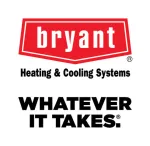A heat pump turning on and off immediately is often caused by short cycling, which can result from issues like incorrect sizing, clogged air filters, low refrigerant, or a malfunctioning thermostat. If your heat pump keeps turning on and off, it may indicate an underlying problem that could be driving up your energy bills and reducing your system's lifespan.
When a heat pump turns on and off every few seconds, it struggles to maintain a consistent temperature in your home. This behavior, known as short cycling, can occur for multiple reasons. This blog will address the common causes of short cycling, how often your heat pump should cycle on and off, and how to troubleshoot and fix the issue.
Understanding Short Cycling in Heat Pumps
Short cycling occurs when your heat pump turns on and then shuts off too quickly, preventing it from completing a full heating or cooling cycle. Instead of running for 10 to 20 minutes at a time, the system repeatedly turns on and off every few seconds or minutes, leading to inefficiency and increased wear on its components.
Heat pumps are designed to run in cycles, maintaining indoor temperatures without excessive stopping and starting. Under normal conditions, a heat pump should cycle on and off approximately two to three times per hour. If it's doing so more frequently, something is wrong.
Common Causes of a Heat Pump That Keeps Turning On and Off
Several factors can cause a heat pump to cycle on and off too often. Some issues are easy to fix, while others may require professional intervention.
1. Incorrectly Sized Heat Pump
If your heat pump is too large for your home, it may turn on and shut off too quickly because it heats or cools the space faster than necessary. While this might seem efficient, it actually causes several problems. The rapid cycling leads to uneven temperatures across different rooms, making some areas too warm or too cold. Additionally, the frequent starting and stopping puts excessive strain on system components, accelerating wear and increasing the likelihood of breakdowns. Over time, this added stress can significantly reduce the overall lifespan of the heat pump, leading to costly repairs or the need for early replacement. Proper system sizing is crucial to maintaining consistent comfort and energy efficiency.
Conversely, if the unit is too small, it will struggle to reach the desired temperature, causing it to cycle on and off frequently as it attempts to keep up.
2. Dirty or Clogged Air Filter
A clogged air filter restricts airflow, making the heat pump work harder than necessary. When the system overheats due to poor airflow, safety mechanisms may cause it to shut off after 30 seconds to prevent damage.
To avoid this issue, check your filter monthly and replace it as needed. A clean filter allows for proper airflow, preventing overheating and short cycling.
3. Low Refrigerant Levels
Refrigerant is essential for heat transfer in a heat pump system. If refrigerant levels are low due to a leak, the system may struggle to maintain pressure, causing it to turn on and off every few seconds.
Signs of low refrigerant include:
Weak airflow
Ice forming on the evaporator coil
Unusual hissing or bubbling noises
Higher energy bills due to inefficiency
If you suspect a refrigerant leak, contact an HVAC professional to inspect and recharge your system.
4. Malfunctioning Thermostat
A faulty thermostat can cause a heat pump to turn on and off immediately if it sends incorrect signals to the system. This issue often stems from incorrect placement, such as being too close to a vent, window, or direct sunlight, which can cause inaccurate temperature readings. If the thermostat is wireless, low battery power may prevent it from maintaining a stable connection with the heat pump. Additionally, outdated or malfunctioning components within the thermostat can cause erratic behavior, leading to short cycling. Ensuring the thermostat is properly placed, has fresh batteries, and is in good working condition can help prevent unnecessary system disruptions.
To fix this, try moving the thermostat to a neutral location, replacing the batteries, or upgrading to a smart thermostat for more accurate temperature control.
5. Faulty Capacitor or Electrical Issues
The capacitor is responsible for providing the initial jolt of power to the heat pump's compressor and fan motors. If the capacitor is faulty, your heat pump may turn on and then shut off immediately due to an inability to sustain operation.
Other electrical issues that can cause short cycling include loose or corroded wiring, which can lead to inconsistent power delivery and cause the heat pump to shut off unexpectedly. A failing control board may also disrupt communication between system components, preventing the heat pump from running a full cycle. Additionally, tripped circuit breakers can cut power to the system, causing it to turn off abruptly and restart repeatedly. These electrical problems can be difficult to diagnose without professional expertise, so if your heat pump continues short cycling, it's best to have an HVAC technician inspect the system.
If you notice flickering lights, buzzing noises, or other electrical irregularities, it's best to have an HVAC technician inspect your system.
How Often Should a Heat Pump Cycle On and Off?
A properly functioning heat pump should cycle on and off about two to three times per hour. During extremely hot or cold weather, the system may run more frequently, but it should still complete full cycles rather than turning off too quickly.
If your heat pump turns on and off every few seconds, it's experiencing short cycling, a problem that should be addressed immediately to avoid serious consequences. This constant stopping and starting wastes energy, leading to higher electricity bills as the system struggles to maintain the desired temperature. Additionally, short cycling puts excessive strain on the compressor and other components, accelerating wear and potentially causing premature failure. If left unchecked, this issue can result in a complete system breakdown, requiring costly repairs or even a full replacement. Addressing short cycling early can help improve efficiency, extend the lifespan of your heat pump, and prevent unnecessary expenses.
How to Fix a Heat Pump That Keeps Turning On and Off
If your heat pump is short cycling, try these troubleshooting steps before calling a professional:
1. Check and Replace the Air Filter
Since a dirty air filter is one of the most common causes of short cycling, start by inspecting it. If it's clogged with dust and debris, replace it with a clean one. This simple fix can often prevent the heat pump from overheating and shutting down prematurely.
2. Inspect the Thermostat Settings
Make sure your thermostat is set to the correct temperature to ensure your heat pump operates efficiently. It should not be located near vents, windows, or direct sunlight, as these factors can cause inaccurate temperature readings. If your thermostat uses batteries, check that they are fresh and replace them if necessary. Additionally, ensure that the thermostat is properly calibrated so it accurately controls your heating and cooling system.
Upgrading to a smart thermostat can help improve efficiency and prevent temperature fluctuations that lead to short cycling.
3. Look for Refrigerant Leaks
If you suspect a refrigerant issue, avoid running the heat pump until a professional inspects it. Continuing to operate a system with low refrigerant can damage the compressor, leading to costly repairs.
4. Clean the Outdoor Unit
Leaves, dirt, and debris can obstruct the outdoor unit, reducing airflow and causing overheating. Make sure the area around the unit is clear, and gently clean the coils if they appear dirty.
5. Reset the System
Sometimes, simply resetting the heat pump can resolve short cycling. To do this:
Turn off the thermostat.
Shut off power to the heat pump at the breaker.
Wait five minutes.
Turn everything back on and observe the system.
If the issue persists, a deeper inspection is necessary.
When to Call a Professional
If you've tried these fixes and your heat pump still keeps turning on and off, it's time to call an HVAC technician. Short cycling can be a sign of more serious underlying issues that require professional attention. One common culprit is compressor failure, which prevents the system from maintaining proper pressure and leads to frequent shutdowns. Electrical malfunctions, such as wiring issues, capacitor failures, or control board problems, can also disrupt the system's ability to run efficiently, requiring expert repair.
Additionally, low refrigerant levels can cause the heat pump to cycle erratically, but only a licensed technician can safely inspect for leaks and recharge the system. If the unit is improperly sized—either too large or too small for your home—a professional may need to assess the system and recommend a long-term solution. Ignoring short cycling can lead to higher energy bills, costly repairs, or even a full system replacement, so don't wait to address the issue before it worsens.
Final Thoughts
A heat pump turning on and off immediately is a clear sign that something isn't working correctly. Whether it's a clogged air filter, low refrigerant, or thermostat issues, diagnosing and fixing the problem early can prevent costly repairs and improve your home's energy efficiency.
If your heat pump kicks on and off every few seconds, take action now. Start with simple troubleshooting steps like checking the filter and thermostat, and if the problem persists, call an HVAC professional at The Air Company of Georgia. Keeping your heat pump cycling at a normal rate will ensure a more comfortable home and a longer-lasting system.




